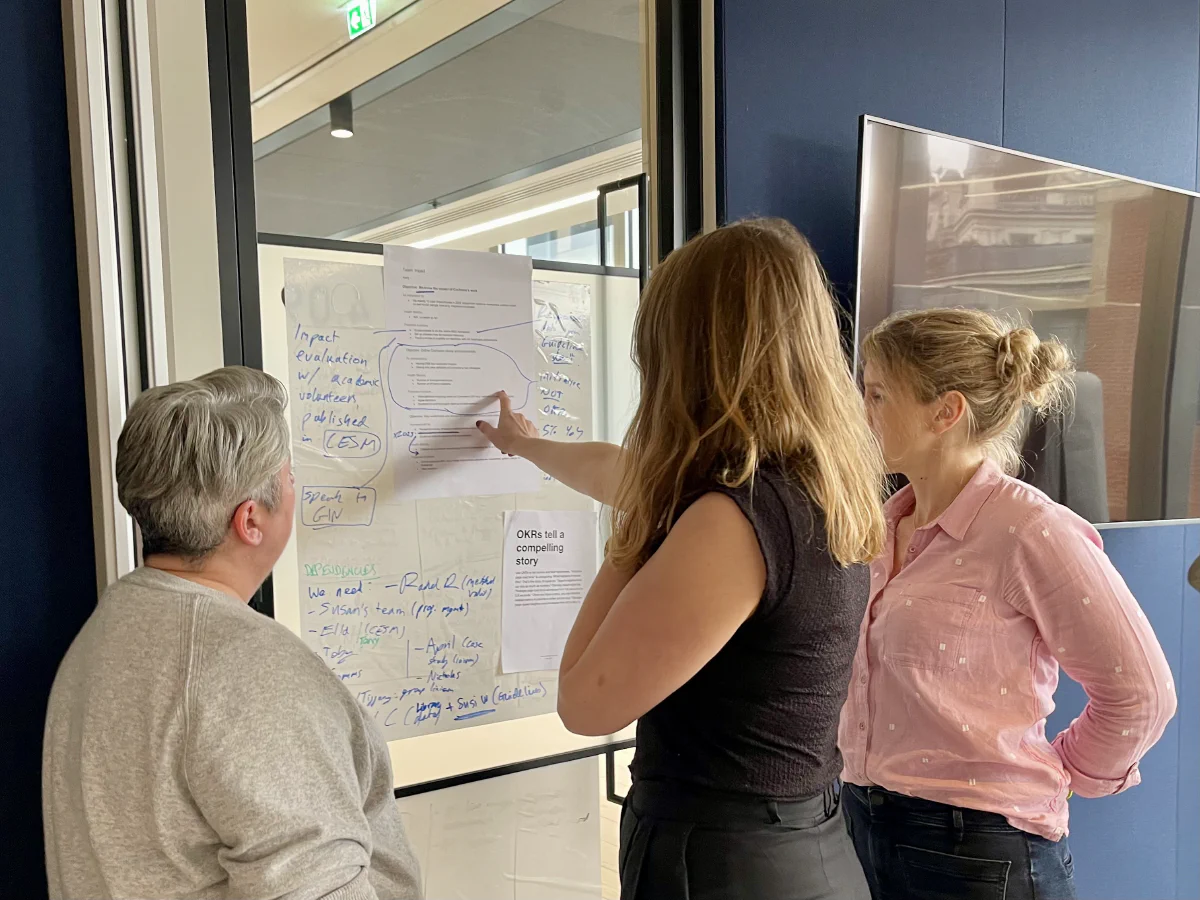Building an OKR Community

OKRs often fail not because the framework is flawed but because implementation is inconsistent.
Getting started with OKRs takes study, reflection, and practice. Successfully scaling the practice takes encouragement, sharing, and support across the organisation to achieve broad consistency, experience, and skill.
Creating internal OKR communities of practice (CoPs) is my favourite way to help OKRs succeed. I try to do this in every coaching engagement I take on.
I’ve seen OKR communities make or break OKR implementations, particularly at larger and fast-moving organisations where OKRs can become just another box-ticking exercise or an expectation that senior leaders set for teams without really taking on the critical but often slow and subtle cultural transformation that follows initial OKR adoption.
Stories from the field
At the UK Government
While working with the UK Government’s Government Digital Service to roll out OKRs in 2024, we created a robust community with weekly meet-ups, guest-facilitation, and our own internal set of training materials, and guidance. When we were blocked from procuring a dedicated OKR SaaS tool, we even leveraged the community to help us create a simple OKR tracking & sharing system based on Google Sheets, Google Application Script, and Vue.js.
This made all the difference between OKRs being “inflicted” upon the organisation and teams feeling “invited” to participate in a movement that was useful, fun, and exciting. It had real energy, momentum, and continual evolution becoming something that a lot of teams actually enjoyed.
OKRs for Ukraine
This year I’ve been supporting the Ukrainian Ministry of Digital Transformation with OKRs. They’ve just kicked off their internal OKR community of practice to help grow and embed the use of OKRs across the Ukrainian government. It has the wonderful mission to “unite proactive leaders through a common language and the practice of the OKR methodology to help build a safer and more prosperous Ukraine”.
“Unite proactive leaders through a common language and the practice of the OKR methodology to help build a safer and more prosperous Ukraine.”
– Ukrainian Ministry of Digital Transformation
A perfect match: OKRs and communities
Helpfully, OKRs have a lot in common with communities of practice and naturally lend themselves to creating them.
Both OKRs and CoPs help teams to understand their context, ambitions, and leverage helping them grow together and maximise their impact.
OKR Check-ins are essentially a community activity to reflect as a team on what’s happening around OKRs for the team, what’s working well and what different things we can try. They’re also a way to communicate externally so other teams and stakeholders can understand what’s happening and help wherever possible.
When individuals across the organisation share challenges, ideas, and techniques through a community, it instantly makes your OKR-drafting and OKR alignment sessions faster, deeper, and more valuable.
What are Communities of Practice?
I’ve written previously about “chapters at work” also known as communities of practice.
They help organisations to break down silos, accelerate professional development, share and grow knowledge, and achieve both greater standardisation and innovation across an organisation’s OKR practice.
Teaching others is the best way to deepen your own knowledge and as a learner it’s easier to try something new with someone you know and trust.
Additionally, people love being part of a community! It makes their work more rewarding and fulfilling.
My former boss and mentor Emily Webber has written a great book about communities of practice and lot of what I recommend for nurturing OKR communities has been informed by her work.
How to Get Started
It doesn’t take much to start a community of practice. I can be as simple as getting a few folks together regularly to talk about OKRs and share ideas. Here are some tips to help you get going.
-
Start small & informal: Begin by reaching out to interested, enthusiastic individuals – these are probably the people in your organisation who are already running OKR workshops, asking good questions during sessions, helping others to refine their OKRs, and working to help their teams continuously improve. Suggest that you get together with a few others just to chat. Keep things very informal at first.
-
Establish a cadence: Like any new habit, consistency is key. After an initial session, ask the group if they would consider meeting again. Ask the group to determine what is a realistic cadence and duration for each session and then try to stick to this for 3-4 sessions before making changes. I suggest 30-60 minutes every fortnight to begin.
-
State your purpose: It’s useful to have a short purpose statement to remind the group why they’re getting together. One way to do this is to invite each person to share 1-2 words describing aspects of a good purpose statement. Discuss and then share 1-2 words that should be included in this community’s purpose statement. Finally, get into small groups to try writing a single sentence defining what the OKR community is (and isn’t). Is it a learning group? A support circle? A place to establish OKR standards in your organisation? Be explicit.
-
Create a chat channel: Keep the conversation going between meetings. Create an instant messaging channel in whatever tool you use for the community to use. Consider opening it to the whole organisation so anyone can bring questions or insights at any time. It’s a great way to keep engagement up and see where the interest is.
-
Build a library: Use the community as a way to build up your library of OKR resources that resonate with your organisation. Find thinkers you like and link to their material but don’t stop there: develop your own writing, examples, training slides, OKR playbooks and even videos that anyone can use as a reference when they need help.
-
Build experience: As the group becomes bigger and more confident, begin offering support to other teams via OKR facilitation, training for OKR newbies, or OKR Q&A sessions, refinement feedback, and generally exploring ways the community can serve the entire organisation. Holding monthly or even weekly lunch & learn sessions is a great way to engage with the wider organisation. This has the useful by product of giving your community practice at facilitating and become internal OKR coaches.
-
Share progress: It’s important to communicate outwards from the community. The chat channel mentioned above is a great way to begin. Also consider writing weeknotes and holding regular “show & tells” to share what you’re doing and learning. It’s a great way to keep OKRs on everyone’s mind and invite greater participation.
-
Retrospect: As with any group of people, take time periodically to reflect on how your OKR community is going. What changes do you need to make? Consider a short “fist-to-five” ROTI at the end of every session.
How to make yours shine
-
Be inclusive: Encourage the initial group to reach out to others who may want to join, invite guest speakers or new members from groups like product managers, team leads, HR reps, and others who influence team focus and performance. Diverse perspectives enrich the community.
-
Keep it fresh: Rotate the role of facilitator so everyone can practice and nobody owns the entire burden of getting everyone together and running the sessions. Invite members to share different things and propose different types of activities and learning exercises. They could be as simple as holding a lean coffee or discussing a blog post all the way to trying out a new facilitation technique for running various OKR ceremonies like weekly OKR check ins.
-
Make it easy: Be clear on what the expectations are (or aren’t) for people to join the community. Explore different levels of involvement based on their interest and availability. By allowing people to dip in and be casually involved or take a stronger ownership role in driving the community you’ll maximise the number of people who get involved and the contributions they can make.
-
Make it fun: Start a meeting by asking members to write an OKR for a fictional character like Batman’s quarterly OKRs, for instance. It disarms defensiveness and encourages creative thinking.
-
Explore the anti-patterns: Normalise failure. Share examples where OKRs didn’t work and explore why. This builds psychological safety and deepens learning. Activities like TRIZ are great for exploring anti-patterns in a fun way.
Avoiding common gotchas
-
Low engagement: If participation drops, ask people why. Are the meetings too theoretical? Are time slots bad? Try rotating formats—OKR clinics, guest speakers, or peer coaching sessions.
-
Becoming the “OKR Police”: Avoid turning the group into an enforcement body. If it becomes a place to “police” OKRs, people will disengage. Keep the tone exploratory and supportive.
-
Becoming another status meeting: the community is NOT a place to provide status updates on OKRs or even OKR roll-out. There are separate ceremonies for that. Keep this a conversation that folks look forward to and a welcoming place to grow and share ideas.
-
Don’t be Atlas: It’s tempting and sometimes necessary at the start to carry the community entirely on your own shoulders. But if one person drives everything, the community won’t be resilient and people won’t contribute as much as they can. Move away from this model as quickly as you can by distributing leadership, rotating facilitators and assigning roles like note-taker, topic curator, or guest wrangler in each session.
-
Misalignment with leadership: If leadership is not supportive or models poor OKR behavior, the community may lose momentum. Use your group to provide feedback upstream—what’s working and what’s not.
Do it now!
A successful OKR community is one where learning is ongoing, reflection is welcome, and people feel more confident navigating ambiguity together. Build it patiently, listen often, and don’t be afraid to experiment.
But remember that your OKR community of practice can begin with a single conversation. Don’t let ideas about a “perfect OKR community” prevent you from doing something easy and useful right now.
Send this guide to one other OKR-enthusiast in your organisation right now and watch it grow!

